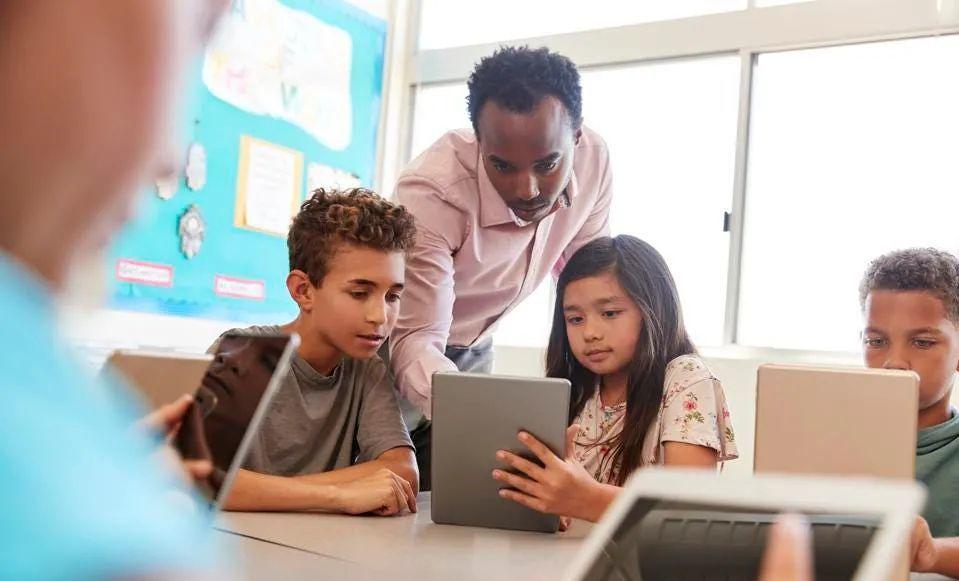
Teachers teach elementary school students to use tablets in class (Photo: GETTY)
How can AI technology better play a role in education and entertainment? The original post was posted on Quora, a knowledge popularization and sharing forum, and here's the answer from the professionals.
Source | Forbes
Author | Patricia Scanlon
Edited by | Tech Walker
Respondents were Dr. Patricia Scanlon, founder of SoapBox Labs:
When it comes to the intersection of children and technology, most discussions focus on "children watch screens for a few hours a day" or "should children be exposed to technology" and so on. But perhaps the really important question should be – what unique benefits can technology bring to students' learning and entertainment lives? How can we realize these benefits?
Speech recognition is an AI technology that provides many unique learning and entertainment experiences for children through voice. Personally, I feel this is a unique opportunity to use speech recognition for all ages and learning stages
of children provide a stronger, happier and more immersive experience. And it's an experience they don't enjoy in other scenes.
Here are just a few examples:
1. Reading: Speech reading tools can help children cross the reading threshold as soon as possible before they learn to read, read or speak, and eliminate a considerable part of the dyslexia problem in advance. And when children are actually exposed to books, speech-enabled reading apps can also listen, prompt, correct, and encourage them to grasp the meaning of the text in the process, just like a patient adult instructor by their side.
Speech-enabled reading apps provide instant and accurate feedback to help children make progress on their own, practice regularly, assess their reading skills, and identify areas for improvement. The speech-enabled reading assessment system instantly helps educators and parents understand what parts of the content are not in place, and helps them support children to achieve their reading goals in a more personalized way.
2. Language learning: The assessment tool can listen to the children's pronunciation speech and immediately return the pronunciation score with encouraging feedback, the whole experience is very similar to the company of parents or teachers. Taking Lingumi, an English learning platform for 2 to 6-year-olds, as an example, it embeds speech recognition technology designed for children into the application, enabling them to carefully "listen" when children are practicing speaking, and then give accurate and immediate feedback like experienced language teachers based on indicators such as whether pronunciation is standard and whether they are fluent.
3. Math: Children who are illiterate can also use speech-enabled apps to help them initially understand the abstract concepts behind these symbols before they recognize the numbers. Voice-enabled apps can make the entire math learning experience more fun and interactive. The course content offered by these apps will also be constantly adjusted as the child grows and his mathematical skills deepen.
We can imagine a 6-year-old being exposed to math for the first time at home: the app will show them a picture of 5 apples and ask the child "How many apples can you see?" Kids blurted out "5!" The app will return the correct voice prompt and further ask "If you eat 3, how many are left?" The child shouted, "2!" "The more questions your child answers correctly, the harder it is to apply the questions that follow up. If your child answers incorrectly, the app will encourage them to try answering again after prompting.
4. Interactive TV: Today's children's episodes and movies are fun, but they are still essentially a passive one-way experience. Although the child loves the adventurous Dora, he will never be able to talk to her and help her explore the jungle. The addition of voice capabilities will completely subvert the traditional entertainment paradigm.
Future television and movies may offer many branches where children can guide their favorite characters and choose where they're going to go next. Interactive TELEVISION gives kids the opportunity to enjoy the beginning, middle and end of each different adventure. By shouting out their choices, kids can start a new journey on their favorite shows at any time. Of course, this is just my imagination of the future interactive TV viewing experience, but I sincerely hope that my children can have such a wonderful childhood experience.
-END-